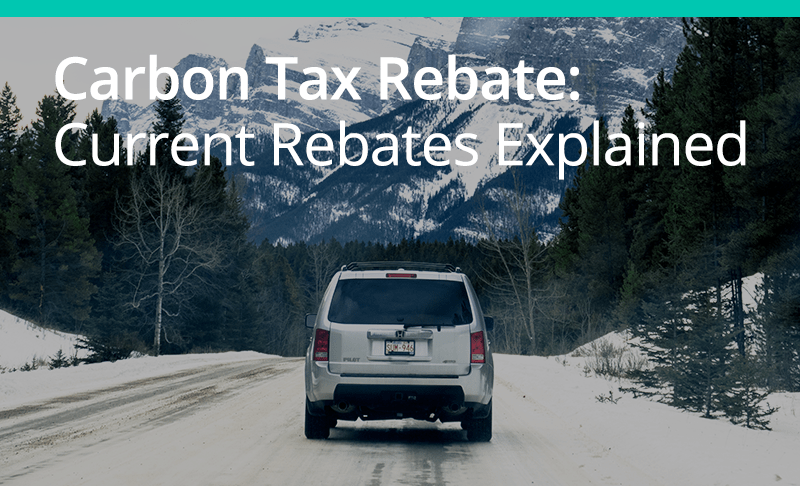
Carbon Tax Rebate: Current Rebates Explained
Canada’s carbon tax rebate program is intended to mitigate climate change impacts. While the debate over the merits of carbon tax rebates continues, drivers should be aware of how the program may impact them financially.
IN THIS POST, WE COVER:
- What is a carbon tax rebate?
- How does carbon tax work in Canada?
- How much are current carbon tax rebate rates?
- How can Canadians claim carbon tax rebates?
Gas-burning vehicles are a major contributor to carbon pollution and many governments are taking steps to curb emissions in one way or another. One method being used in Canada is a tax on carbon pollution. The Greenhouse Gas Pollution Pricing Act, adopted in June 2018, put a price on carbon emissions. Dubbed the “carbon tax”, the Act created a rebate program that’s designed to put money back in the pockets of Canadians living in certain provinces. Here’s what you need to know about the carbon tax rebate program and whether you qualify.
What is a carbon tax rebate?
Carbon tax rebate programs are designed to encourage businesses and individuals to turn to cleaner energy sources. Governments can impose a carbon tax on certain non-renewable energy sources, such as gas. Consumers and businesses can then make a choice: continue using non-renewables and pay more for them or switch to energy sources that are more sustainable.
In the case of carbon taxes that apply to gas, for example, drivers and businesses that use delivery or other vehicles may have more incentive to switch to hybrid or electric vehicles to reduce cost. This helps the government in accomplishing its goal of reducing greenhouse gas emissions. The revenue raised by the tax then gets paid back to taxpayers in the form of a rebate or credit when they file their return.
How does carbon tax work in Canada?
Under the Greenhouse Gas Pollution Pricing Act, there are two parts to Canada’s carbon tax program:
- An output-based pricing system for industry
- A regulatory charge on fuel
It’s important to note that the Canada carbon tax is not universal; whether you’re subject to the tax depends on where you live.
For example, the pollution pricing system for industry applies in Ontario, Manitoba, New Brunswick, Prince Edward Island and parts of Saskatchewan. The federal fuel charge applies in Saskatchewan, Ontario, Manitoba and New Brunswick. In 2020, Alberta will also be subject to the federal fuel charge.
Certain provinces are excluded from the federal fuel charge, as they’re already implementing or will implement a carbon tax program similar to the federal program. Those provinces include British Columbia, Quebec, Nova Scotia, Prince Edward Island and Newfoundland and Labrador.
The amount of the fuel charge means gas will cost approximately 4 cents more per litre for 2019. The carbon tax is set to increase annually, leveling off at 11 cents per litre in 2022. For 2019, the typical driver can expect to pay around $100 more annually for fuel costs.
For individuals and families that rely on gas to heat their homes, the estimated yearly increase varies. In Ontario, for example, households are expected to pay $244 more in heating costs, while Saskatchewan residents will see a hike closer to $400. Those amounts are expected to rise to $564 and $946 respectively by 2022.
In provinces that have not made a commitment to pricing carbon pollution, households can benefit from receiving a carbon tax rebate. The rebate, known as the Climate Action Incentive or CAI, is a way for the government to return proceeds from the fuel charge to individuals and families. Currently residents of Ontario, New Brunswick, Manitoba, Saskatchewan and Alberta are eligible to receive CAI rebates.
How much are current carbon tax rebates?
The amount of carbon tax rebate Canadian households are eligible for depends largely on family size and which province they reside in. Like the tax itself, tax rebates are expected to increase through 2022.
Here are the current average carbon tax rates for 2019:
- Ontario: $300
- New Brunswick: $248
- Manitoba: $336
- Saskatchewan: $598
These figures are just the average. The Canadian government also offers guidelines for what a family of four could receive:
- Ontario: $307
- New Brunswick: $256
- Manitoba: $340
- Saskatchewan: $609
By 2022, the carbon tax rebate will max out at $718 and $1,459 for a family of four. Approximately 90% of the revenue received from the fuel charge will be passed back to Canadians through Climate Action Incentive payments.
How can Canadians claim carbon tax rebates?
Carbon tax rebates are claimed when you file your tax return. There are a few things to know to claim carbon tax rebates for yourself and/or your family.
First, you must be at least 18 and live in one of the provinces subject to the fuel charge to claim the rebate. Second, you’re only allowed one credit for the carbon tax per household. So if you live with someone but you file your taxes separately, only one of you can claim the credit for everyone in the home.
The rebate is applied automatically to any taxes you owe for the year once you file your return. If you’re expecting a refund instead, the rebate is added on to the total due to be paid back to you.
It’s worth pointing out that there are some exceptions. If you were a non-resident of your province at any time in 2018, for example, you may not be eligible for CAI rebates. Exceptions also apply if you spent more than 90 days in prison or jail, are employed by the government of another country while living in Canada and/or received a children’s special allowance.
If you’re confused about whether you can claim the carbon tax rebate for yourself or household, you may want to talk to a tax professional. They can help you determine whether you’re eligible and how much the carbon tax rebate may be worth to you.
Are you concerned about rising fuel costs and how they may affect your bottom line? Switching to a more fuel-efficient vehicle or changing things up with a hybrid or electric option can help you keep fuel costs in check. You also reap the additional benefit of being able to help lesson greenhouse gas emissions. At Birchwood Credit Solutions, we offer an extensive inventory of vehicles, including fuel-efficient and hybrid models. You can browse our inventory online or visit us in person to find the right vehicle for your driving needs.
We also work with buyers to find financing solutions for people from almost every credit background. If you’re new to Canada and haven’t established credit yet or you’re still recovering from a divorce or bankruptcy, we can help. Contact us today or start your loan application online to learn what type of financing terms you may qualify for.



